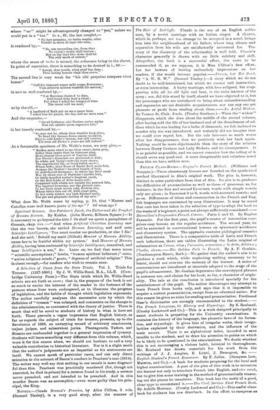A Selection of Cases front the State Trials. Vol. I.
Trials for Treason. (1327-1660.) By J. W. Willis-Band, M.A., LL.B. (Cam- bridge University Press.)—The State trials which Dr. Willis-Bund selects are set forth as cases; that is, the purpose of the book is not so mach to excite the interest of the reader in the fortunes of the persons whose lives were endangered, as to illustrate the progress of legislation, and the habits of thought which legislation represents. The author carefully analyses the successive acts by which the 'definition of " treason " was enlarged, and comments on the change in the administration, as contrasted with the theory of justice: There is much that will be novel to students of history in what is here set -forth. There prevails a vague impression that English history, as far as regards the subject of trials for treason, presents, up to the Revelation of 1688, an unvarying record of arbitrary enactments, unjust judges, and subservient juries. Plantagenets, Tudors, and Stuarts are confounded together in a general impression of tyranny. Students will learn something very different from this volume, which, were it for this reason alone, we should not hesitate to call a very 'valuable contribution to historical literature. Nor is it a slight merit -that the author's judgments are as impartial as his statements are lucid. We cannot speak of particular cases, and can only direct attention to the account of Bacon's conduct in Peacham's case (1614). 'The writer may well say that nothing in our annals is more disgrace- ful than this. Peacham was practically murdered (for, though not 'executed, he died in prison) for a sermon found in his study, a sermon -never preached, and not intended to be preached. And in this murder Bacon was an accomplice,—even more guilty than his prin- cipal, the Ring.


































 Previous page
Previous page